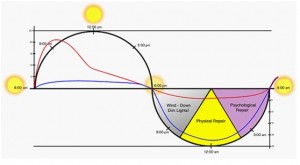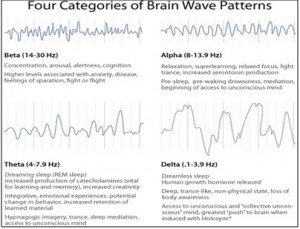Sleep and Health
One of the most important health benefits is sleeping 7 to 8 hours in darkness and quiet every night. Following your natural sleep-wake rhythm or circadian cycle, is one of the most important ways of keeping cortisol (the long term stress hormone) levels balanced during the day.
Our body, including our mind, brain and emotions, operate on a biological clock set to daily cycles, known as circadian rhythms. We normally feel more alert during the daylight hours and less alert at night, a fact of life even for people who have worked nights for a very long time.
Cortisol levels start decreasing after about 4 hours of deep sleep in quiet and darkness, reaching its lowest levels after about 6-7 hours, to slowly rise and waking us up naturally after 7-8 hours of sleep. On the other hand, melatonin (the rest, recovery and replenishing hormone secreted by the pineal gland) start rising in the same sequence, to reach its zenith after 6-7 hours of deep sleep in quiet and darkness, slowly decreasing so that we wake up naturally after 7-8 hours of restful sleep, ready to face our day. Deep relaxation or meditation any time of the day, for one hour, is equivalent to 3 hours of deep sleep.
Sleep is critical to health, wellness and longevity and a vital physical need. We require sleep for survival just as we need food, water and oxygen.
The biggest obstacle to falling and staying asleep is that we fail to
 relax before trying to fall asleep:
relax before trying to fall asleep:
When awake and alert, our brain waves are predominantly in the beta brain wave state, with fast, sharp waves. These waves are easily distinguishable on an electroencephalogram (EEG). The more alert, stressed or worried we are, the higher and faster these beta waves become. High states of beta rhythm are also linked to all our physical ailments and chronic diseases such as high blood pressure, anxiety, depression, heart disease, insulin resistance, metabolic syndrome, diabetes, etc.
As we prepare for sleep, brain waves slow down to alpha rhythm, a state of relaxed awareness. We gradually loose awareness of time and space, feeling more and more relaxed and at peace. We then slip into sleep which is identified by theta brain waves of an even slower frequency. This is also the brain wave state where we dream. Ultimately we go into delta sleep, the deep dreamless sleep where true restoration and recovery of our bodies and minds take place. We move through about 6 cycles of these brain wave states throughout the night. Sleeping tablets prevent the normal cycles of sleep. That is the reason people feel groggy and not rested after taking sleeping pills.
If the brain remains too alert, we cannot relax and fall asleep. A sleep ritual can help prepare you for sleep. Calm down before you go to sleep, with a sleep inducing drink (hot milk with some cinnamon and honey), the firm intention to sleep well, a warm bath, adding some aromatherapy oils of lavender or chamomile to the water; doing stretching exercises and a meditation or progressive muscle relaxation before you try to fall asleep, or listen to guided visualisations on a CD next to your bed.


